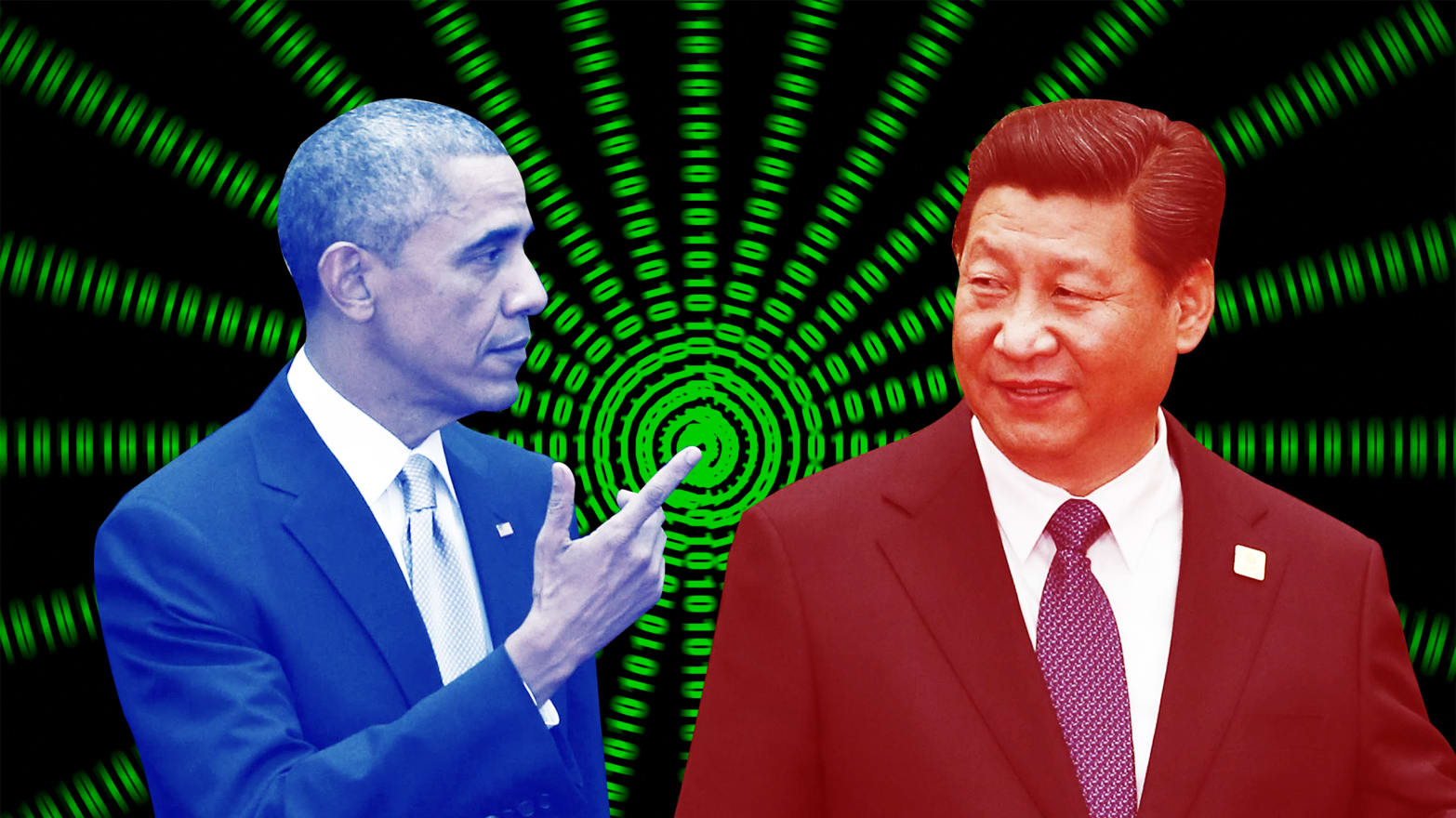The Obama administration is debating whether to issue financial sanctions and potentially criminal indictments against Chinese people and businesses engaged in hacking of American companies, U.S. officials and China analysts told The Daily Beast. It’s a sign of escalating tensions between the United States and China over cyberspying.
Indictments on their own would be largely symbolic, since the accused would almost certainly never see the inside of an American courtroom. But pairing them with economic sanctions would constitute the administration’s strongest public response to a years-long campaign of Chinese cyber espionage that officials say has stolen billions of dollars in trade secrets and intellectual property from companies in practically every sector of the American economy.
Intelligence and law enforcement officials are generally seen as favoring aggressive action both to punish and deter Chinese cyber espionage. White House and State Department officials, however, are more cautious about taking those bold steps, particularly since China’s president, Xi Jingping, is making a state visit to Washington later this week. The White House has already shied away from publicly blaming China for a major hack against the Office of Personnel Management, even though intelligence agencies have concluded China was to blame.
One former U.S. official who is actively involved in U.S.-China relations, and who asked to speak anonymously when discussing sensitive law enforcement matters, said he was aware of several ongoing investigations in which authorities are aiming to bring formal charges against Chinese targets for their role in stealing U.S. companies’ trade secrets and other intellectual property.
Asked if criminal indictments were in the pipeline, a Justice Department spokesman pointed The Daily Beast to comments by John Carlin, the assistant attorney general for national security, who last year promised that the U.S. would bring charges against Chinese hackers. At the time, Carlin was describing indictments the department had just announced against five Chinese military officers for their part in a cyber-espionage campaign against U.S. manufacturing companies.
“We will continue to bring these types of cases,” Carlin said in remarks at the Brookings Institution in Washington. “We would not stand idly by as people hauled away our wealth in trucks. Likewise, we cannot allow it to be sucked out through the Internet.”
Those comments echoed remarks by a senior FBI cybersecurity official, who said at the time that filing criminal charges against foreign hackers was “the new normal.”
But the administration’s efforts to ratchet up pressure on China—which officials have been telegraphing to reporters in a series of recent anonymous leaks and trial balloons—is fraught with risk.
On the one hand, the administration has spent the past few weeks raising expectations that they will take action against China. Adding the threat of indictments to the pile only raises the stakes and makes it more likely that Obama will look feckless or indecisive if his team ends up not following through.
Second, any use of sanctions will draw a response from China.
“If these sanctions come out, you’re definitely going to see retaliation against U.S. companies,” Samm Sacks, a China analyst at the Eurasia Group, told The Daily Beast. For instance, she said, the Chinese government has been contemplating whether to enact a set of proposed laws that would require foreign companies doing business in China to store their data in the country and to provide the government with backdoor access to their technology for national security purposes. If the Obama administration issues the sanctions, the laws will go into effect, Sacks said.
The Chinese are likely to respond “proportionally” to any U.S. penalties, Sacks added. If the administration sanctioned a Chinese manufacturing company, the Chinese would likely retaliate against specific companies in that sector, and not broadly across the U.S. economy.
The administration seems to think that merely raising the threat of sanctions could have a deterrent effect of its own and head off an international trade battle.
“They’re hoping that by at least pulling out the baseball bat they might not have to swing it,” Scott Kennedy, the deputy director of the Freeman Chair in China Studies at the Center for Strategic and International Studies in Washington, told The Daily Beast.
The Chinese are paying attention, and putting the Obama administration on notice, too. In an exchange with reporters in Maryland over the Labor Day weekend, the Chinese ambassador to the U.S. said sanctions wouldn’t serve either country’s interest.
Both countries are the target of cyberattacks, and “this means that China and the U.S. have every reason to conduct more communications and cooperation in this regard, instead of moving towards conflict and confrontation,” Ambassador Cui Tiankai said when asked about the threat of sanctions, according to China Daily. “I hope the U.S. side will make a smart choice.”
The White House is testing China now, in what Kennedy described as a significant departure from past practice.
“The broader picture of the administration’s policy has been to do everything not to slight the Chinese,” he said, and to focus on higher-priority issues with Iran, Russia, and in the Middle East. “The Chinese figured out that the Obama administration had no red line and they would pay no cost for anything while Obama was still in office,” Kennedy said. “And so they became much more assertive in the South China Seas and cyberspace and in a variety of different areas. The administration is now debating whether they need to inflict more penalties on the Chinese.”
However, not every element of the administration is on the same page when it comes to precisely how and when to punish China. The FBI, in particular, has in recent weeks made clear that it sees China as one of the biggest intelligence threats. In a rare on-the-record briefing with reporters in July, the bureau’s top counterintelligence officials revealed they were investigating “hundreds” of cases of Chinese spying on U.S. companies.
China’s intelligence services are “as aggressive now as they’ve ever been,” said Assistant Director Randall Coleman, who runs the bureau’s counterintelligence division.
The White House has been more measured. Asked to comment on China’s hacking campaigns, a senior administration official said that Xi’s visit “is an opportunity to expand our cooperation on a range of issues important to the American people and to press for progress in areas of concern. The president will speak candidly about the differences we have in this exceptionally complex relationship.”
Administration officials have raised concerns about China’s cyberspying before, but usually in closed-door sessions and in the context of broader complaints about Chinese behavior, including its claims to disputed islands and waters in the Pacific Ocean.
When the administration has tried to send a less-mild message, it has sometimes been obliquely and in ways that don’t send an unequivocal message of disapproval. Last June, for instance, Obama chose not to meet with Fan Changlong, the vice chairman of China’s Central Military Commission and his country’s counterpart to the U.S. Secretary of Defense, when Fan visited the White House. A presidential “drop-by” is customary when officials of Fan’s stature come to Washington, and two former U.S. officials familiar with the details of Fan’s trip said Obama’s decision could be perceived as a rebuke.
But the move was barely noticed outside some Chinese press reports, and Fan did meet with other senior officials, including Defense Secretary Ash Carter and National Security Adviser Susan Rice, who raised “areas of disagreement,” including on “cyber issues,” the White House said in a statement, without specifying which ones.
Ultimately, the decision of when and how to act rests with Obama.
“A key part of the pressure here is from the president,” Ken Lieberthal, a senior fellow and China expert at the Brookings Institution, and a former senior National Security Council official, told The Daily Beast.
“I think the president has made very clear privately and publicly a deep concern and anger over the massive theft of intellectual property from U.S. firms and the use of that information to the advantage of Chinese firms,” he said.
And, Lieberthal added, there’s a way for Obama to tie this foreign policy decision to one of his top domestic priorities. “Keep in mind here that his biggest task since he was elected in 2008 has been to grow jobs here in the United States. I think he is seeing theft of intellectual property like this as directly making it more difficult for him to be successful.”
It’s also true that the consequences of not acting can be laid at the president’s feet. Jack Goldsmith, a former head of the Office of Legal Counsel during the George W. Bush administration, has criticized Obama officials’ approach, saying their “public hand-wringing about whether and how to sanction China is harmful.”
In a post for the blog Lawfare last month, Goldsmith recounted the numerous instances over the years when officials have said they were considering punishing China but didn’t act.
“It is quite possible that more is happening in secret,” Goldsmith wrote. “Still, the aggregate effect of public stories about the administration’s persistent inability to do come up with a serious response to China’s cyber intrusions is, I think, devastating to our public and private security.”

